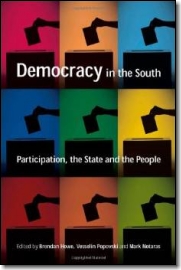
Mark R. Thompson Director
Contact Details:
Prof. Mark R. Thompson
Department of Asian and International Studies
City University of Hong Kong
E-mail: mark.thompson[at]apisa.org
By the close of the twentieth century, the retreat of the authoritarian state in Asia was the norm rather than the exception in Asian politics. Even the communist states like China and Vietnam had moved towards political liberalization and free-market economies while military dictatorships wilted under pressure from people’s power within and global democratization without. Today, only a handful of states resist the universal claims of democracy.
Be that as it may, universalism is a contested concept which in turn suggests that democracy has its detractors, especially since traditional forms of government and adapted variants of it vie for legitimacy. Alongside are the dangers of regression towards authoritarianism. While these processes are by themselves worthy of research (especially in comparative terms), so are the themes pertaining to the transitions from authoritarianism and consolidation of democracy.
Of special interest too are the relationships between democracy on the one hand and economic growth, citizenship, human rights, class, ethnicity, gender, globalization, global hegemony and the world capitalist system of the other. Equally important is the relationship between the governed and the governors, which brings into view issues pertaining to justice, equality and liberty, elections, civil society and the limits of dissent. In other words, what is the balance between the governed classes' restraints on the governors and the governors' ability to govern?
Governance has its own uniqueness and is often the product of the peculiarities inherent in a specific socio-political system and the personalized style of the policymakers. But in the context of the modern day state system that is increasingly imbued by capitalist values and practices, certain attributes are held constant in assessing the performance, and in some cases, the legitimacy, of governments. These relate to the politics of economic performance, corruption, accountability and transparency, rule of law, use of force, conflict management, reforms and the management of change.
APISA takes a keen interest in academic inquiry pertaining to the subjects of democracy and governance in Asia. This program is supported through institutional linkages, subsidies and grants for individual and group research, workshops and summer institutes. The Democracy and Governance Working Group coordinates this program. The group organizes specific Research Projects around which members, along their areas of expertise, converge.
Members of APISA are welcome to establish their own research group under the Democracy and Governance Program. Applications should be directed to the Director.
Publications
Democracy in the South: Participation, the State and the People
Edited by Brendan Howe, Vesselin Poposvki and Mark Notaras

Traditionally, studies on democracy have focused on the orthodox so-called Northern models of democratic governance, and within this framework, the extent to which Southern models are considered democratic. Democracy in the South is the first truly international collaboration that draws attention to the complex problems of democratic consolidation across the majority world. Nine case studies, three each from Africa, Latin America and Asia, shed light on the contemporary challenges faced by democratizing countries, mostly from the perspective of emerging theorists working in their home countries.
Students of comparative politics will benefit from this book’s refreshing approach in broadening the level of analysis required for discussions on democracy. The book will enable an already growing literature on democratization to become more relevant to theorists, practitioners and policy makers in democratizing countries, where much of the world’s population lives.
Ramesh Thakur, director, Balsillie School of International Affairs
Albrecht Schnabel, senior fellow, Geneva Centre for the Democratic Control of Armed Forces
Link to publisher
